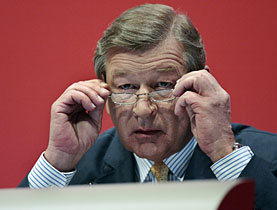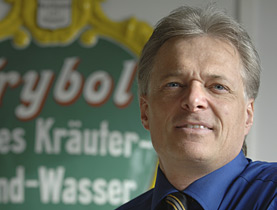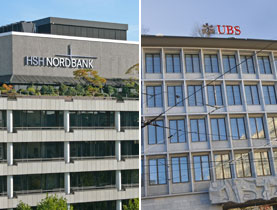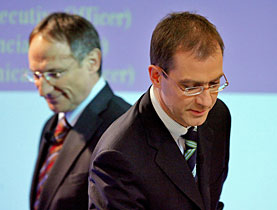Government won’t join UBS bailout

Switzerland's largest bank UBS does not need a government bailout to overcome its United States subprime woes, according to Swiss President Pascal Couchepin.
But in an interview given ahead of the bank’s extraordinary shareholder meeting on Wednesday, Couchepin criticised chairman Marcel Ospel, saying he should hand back some of his more than substantial salary.
Shareholders are being asked to approve a SFr13 billion ($11.94 billion) capital injection from Singapore and an unidentified Middle East investor. But they are also expected to vent their wrath at Ospel over the huge subprime write-offs.
Ospel has survived at the helm of the giant Swiss bank after culling top managers over the past year as UBS chalked up $18 billion in charges after making disastrous investments in the subprime mortgages sector.
The write-downs, which led the bank to unveil its first full-year loss in 2007 in more than a decade, have forced UBS to seek the emergency injection.
Some investors are surprised that Ospel has not already been forced out.
UBS last week said it would propose re-electing the chairman but reducing his term of office to one year. The proposal will be put to shareholders at an annual assembly in April.
More respect
The Swiss president said the Zurich-based banking giant would find a way out of the crisis. His remarks were made in an interview to be published in Wednesday’s edition of the French-language weekly Bilan.
He added that he thought it was unfair for Ospel to keep on collecting a “huge” salary when his bank was racking up enormous losses. “It’s not the state’s business, but I still think it’s not acceptable,” he pointed out.
Couchepin also said that Ospel should stop criticising the government and politicians, and show more “respect”.
Shareholders at the Wednesday meeting in Basel will be asked to approve the issue of SFr11 billion in notes, convertible into UBS stock, to Singapore’s Government Investment Corporation.
A further SFr2 billion of mandatory convertible notes are also to be placed with an unidentified Middle East investor, subject to shareholder approval.
Analysts believe there is little chance of shareholders throwing out the motion for a capital increase in view of the scale of the bank’s losses. UBS’s stock price has dropped by well over 50 per cent since mid-2007.
Shareholder discontent
Smaller shareholders are saying it is unfair that they cannot participate in the mandatory convertible bond and say the bank should make a rights issue.
They are certainly concerned. “The reputation of my bank has been damaged and I want to know why,” one shareholder told swissinfo as he arrived in Basel. “I want to be reassured that UBS will not go the same way as Swissair.”
Shareholder advocacy group Ethos has put forward a request for a special audit to establish how UBS, which was reputed to have one of the best risk management systems in the financial industry, got bogged down in the subprime quagmire.
“This is the first time in Switzerland that shareholders have been so strongly in favour of such measures,” Dominique Biedermann, executive director of Ethos, told swissinfo. “We’re very disappointed that half the value of UBS stock has been wiped out in the space of a few months.”
Analysts say a rights issue would have to be made at a discount to the market price, forcing the bank to issue even more shares and to dilute the stock further.
“Many people will say they are not happy about the capital increase but everyone understands UBS needs this capital and they will vote for it,” said Jerome Schupp, a fund manager at Banque Syz.
Investors fear there may be more write-downs to come after the bank earlier this month revealed exposures to risky US residential mortgages other than subprime, which were much higher than previously thought.
swissinfo with agencies
UBS endured a tough 2007, starting with the collapse of its hedge fund Dillon Read Capital management. Two months after that, in July, chief executive Peter Wuffli abruptly departed without clear explanation.
In October of last year, UBS said it would cut 1,500 jobs in its investment banking arm, including its head Huw Jenkins. UBS chief financial officer, Clive Standish, also left at the same time.
Later that month the bank announced it was writing off SFr4.2 billion on subprime losses and SFr726 million pre-tax loss for the third quarter – the first quarterly loss in nine years.
In December UBS said another $10 billion would be written off as the US subprime crisis deepened.
A further $4 billion was written off in January, bringing the total losses to around SFr20 billion.

In compliance with the JTI standards
More: SWI swissinfo.ch certified by the Journalism Trust Initiative



You can find an overview of ongoing debates with our journalists here. Please join us!
If you want to start a conversation about a topic raised in this article or want to report factual errors, email us at english@swissinfo.ch.